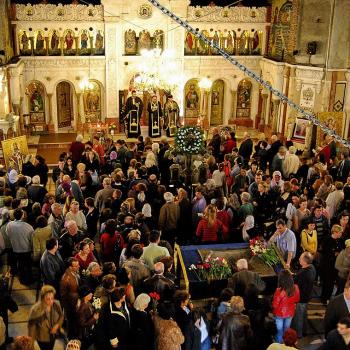Abba Anthony said, “A time is coming when men will go mad, and when they see someone who is not mad, they will attack him saying, ‘You are mad, you are not like us.'”[1]
![By Sergei Kirillov (Own work) [CC BY-SA 3.0 (http://creativecommons.org/licenses/by-sa/3.0)], via Wikimedia Commons](https://wp-media.patheos.com/blogs/sites/637/2016/11/Sant_Basil_The_Prayer-212x300.jpg)
We must understand the text in relation to the life and witness of St. Anthony himself. What he did, what he promoted, must be seen as being what is sane. It will be those who oppose him and his way of life, as it repudiates the “common sense” of worldly life which will declare Anthony and his followers to be mad.
And what was Anthony’s way of life? The radical acceptance of Christ’s words, living them out to the fullest. Anthony understood what Christ meant when he said, “If the world hates you, know that it has hated me before it hated you. If you were of the world, the world would love its own; but because you are not of the world, but I chose you out of the world, therefore the world hates you” (Jn. 15:18-19 RSV).
The servant of Christ will be hated by the world because they will stand in opposition to the world and its ways. The world promotes pride, avarice, and the pursuit of power over the other. The servant of Christ knows true glory lies in humility, true wealth obtained through poverty, and true power is found in apparent weakness. What the world declares to be the goals of life are rejected by the servant of Christ, and so, in disagreeing with common sense, the servant of Christ will be declared mad.
Anthony knew what he accomplished was going to be rejected by the people of the world. And yet, he knew he did so in order to follow Christ’s call to him. When he heard the Gospel story of Jesus telling a rich young man to give all he had to the poor and then follow Christ in poverty, Anthony understood that Christ was also talking to him, telling him what to do, that he was at that point, the rich young man Christ was addressing. At that point in time, he was being asked to give away all that he had so that he could pursue Christ as a lowly hermit.What foolishness! What madness! Why should a young man from such a good family go out on his own, live outside of the glories of civilization, and put his total trust in God with the belief that God will make sure he will be given all he needs to survive?
And yet, look what happened. Anthony succeeded. God had used him to present a new way of life, a way for Christians to take their faith seriously, having their life centered upon God and not worldly concerns. Many took note of what Anthony had accomplished and praised God for it. Others felt they were called by God through Anthony’s example to see what Christians could become, with grace, now that the age of the martyrs was over. The monastic profession took root in Christendom. Christians honored and praised the new ascetics as athletes of God, undertaking a new kind of witness, a new kind of martyrdom, to help spread the glory of God over all the earth. Anthony knew that such honor and respect would not last. Monks like him represented a grave rejection of the ordinary way of life, of the ordinary expectations of the world, and the world would fight back. The world would find many ways to undermine the monastic discipline and to call into question all who pursue it to its proper end, and so, while he and his fellow monks were receiving praise, he warned them not to expect it to last; the fickle nature of the world meant such radical following of Christ will once again be rejected and those who follow it will be considered insane.
The truth of these words go beyond the monastic regime of Anthony and his fellow desert monks. Those who properly follow Christ will do that which the world sees as mad, because Christ’s demands often make it impossible for us to achieve what the world sets up as the proper goals of life. Christians who take the dictates of Christ seriously are considered not only to be fools, but crazy, because they reject those things in the world which the world believes will make people happy. Christians know such things are fleeting, that they come and go, and they provide no everlasting happiness. It is true madness, therefore, to seek beatitude in temporal things which will not last. If our hope lies in them, what shall we have when they are gone?
We have, therefore, two different paths we can take in life, each leading to a different end. The first path is of earthly glory, filled with earthly pleasures and delights, but it ends in the pit of death, for nothing which is attained solely as earthly glory will have lasting impact in the eternity after death. The other path is of spiritual glory. It recognizes the world is good, and is to be honored and respected as good, but it also knows that true glory lies in the kingdom of heaven, that the shallow glory of the world pales in comparison to the spiritual glory found in the kingdom of heaven in which Christ reigns as king. Spiritual goods coming from the kingdom of heaven, unlike earthly goods, can last, so that what is obtained in the spirit can be taken with us into eternity. Christians follow Christ, even when he tells us to do things which the world says is crazy, because we realize that such things provide transcendent, eternal glory, while those whose vision is merely of the world will believe such transcendence is impossible and so deem Christians mad for striving for that which is impossible.
![St. Anthony the Great. Saint Antoine le Grand, icône à l'huile sur toile marouflée sur panneau, de style copte, fin XIXe/début See page for author [Public domain], via Wikimedia Commons](https://wp-media.patheos.com/blogs/sites/637/2016/06/Anthony_the_Great_coptic_icon_19-20_c._priv._coll-212x300.jpg)
See page for author [Public domain], via Wikimedia Commons
Truly, my children, I speak to you as wise men, that you understand what I say to you, and this I testify to you: unless each one of you shall hate all nature of earthly possessions, and renounce it and all its works with all their heart, and stretch out the hands of his heart to heaven, to the Father of all, he cannot be saved. If he do what I have said, God will have pity upon him for his labour, and grant him that invisible fire which will burn up all impurity from him, and our principal spirit will be purified; and then the Holy Spirit will dwell in us, and Jesus will abide with us, and so we shall be able to worship God as we ought. But as long as we have peace with the natures of the world, we are enemies of God and His angels and al His saints.[2]
Anthony, to be sure, wrote this letter to monks who already saw through much of the foolishness of the world. Nonetheless, not all Christians are called to be monks. What is important is that Christians, no matter what their calling, should relativize the world system as it stands, to realize its limits, and to make sure it does not stand in our way to loving God. We must make sure all relative goods are put under God. This means we can and must even hate them insofar as they keep us away from God. It is not a hate which denies the good of the world, but a hate for the way we have learned to interact with the world. For when we have God, all things come to us, and so all that we have lost will be restored in a transcendent fashion, and it will come to us in the vision of God who saw all things as good. We will have all things, not in the way of the world, but in the kingdom of heaven which sees all things and experiences all things in the unity of God.
Salvian the Presbyter agreed with Anthony in the way Christians are to act and live will put them in contention against the ways of the world, and so will be deemed mad if they follow Christ over the commonsense beliefs of the world. We must not look only to the simple, easy to follow commands of Christ, but the hard ones which seem to counter worldly logic, and put them into practice, even if the world tells us reasons why we should ignore them. We must avoid envy and avarice, and instead, live life in charity, seeking to help the other, even those who would claim to be our enemy. Those overturning self-seeking by self-giving take on the “madness” which the world cannot accept, and so Salvian declared, “By repeating these things, I suppose I appear deranged, and I take up upon myself to seem deranged.”[3] This is exactly the madness which Anthony promoted, the madness of God, of God’s righteousness, the madness which lifts us up beyond the limits of human comprehension.
If we know ourselves, we will know our limits and know that what we do only by ourselves for ourselves or others will never last; only that which is established in and with God will last. This means we must be willing to hand over to God our whole self, leaving nothing back. It will likely e frightening to do so, and so it is understandable why those of us with little faith will be tempted to turn back when the demands are tough. Hopefully the light of grace will enlighten us and show us the glory which Christ offers to those who follow him, so that any temptation to turn back to the ways of the world can be overcome. And yet, if we continue, we will find that the world will respond and call us mad. This is what Anthony is telling us in this saying. Those who follow Christ will in some way or another challenge the world, and so the world will challenge us back, calling us mad for rejecting its ways for God’s expectations for us. But with grace, our understanding will grow, and eventually we will be able to laugh at the world’s claims knowing through experience that “the wisdom of this world is folly with God” (1 Cor. 3:19a RSV).
[1] The Sayings of the Desert Fathers. trans. Benedicta Ward (Kalamazoo, MI: Cistercian Publications, 1984), 6.
[2] St. Antony, The Letters of St. Antony the Great. trans. Derwas J. Chitty (Fairacres, Oxford: SLG Press, 1991), 15 [Letter V].
[3] Salvian, The Governance of God in Salvian the Presbyter. trans. Jeremiah F. O’Sullivan (Washington, DC: The Catholic University of America Press, 1962),80.
Stay in touch! Like A Little Bit of Nothing on Facebook:
A Little Bit of Nothing













